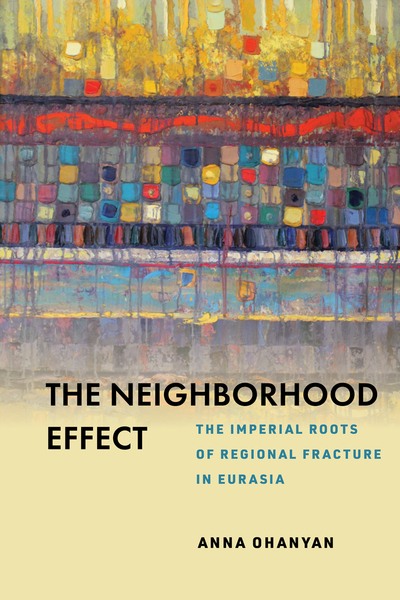
August 2022
312 pages.
$65.00
Hardcover ISBN: 9781503632059
Ebook ISBN: 9781503632066
Why are certain regions of the world mired in conflict? And how did some regions in Eurasia emerge from the Cold War as peaceful and resilient? Why do conflicts ignite in Bosnia, Donbas, and Damascus—once on the peripheries of mighty empires—yet other postimperial peripheries like the Baltics or Central Europe enjoy quiet stability?
Anna Ohanyan argues for the salience of the neighborhood effect: the complex regional connectivity among ethnic-religious communities that can form resilient regions. In an account of Eurasian regional formation that stretches back long before the nation-state, Ohanyan refutes the notion that stable regions are the luxury of prosperous, stable, democratic states. She examines case studies from regions once on the fringes of the Habsburg, Ottoman, and Russian Empires to find the often-overlooked patterns of bonding and bridging, or clustering and isolation of political power and social resources, that are associated with regional resilience or fracture in those regions today.
With comparative examples from Latin America and Africa, The Neighborhood Effect offers a new explanation for the conflicts we are likely to see emerge as the unipolar US-led order dissolves, making the fractures in regional neighborhoods painfully evident. And it points the way to the future of peacebuilding: making space for the smaller links and connections that comprise a stable neighborhood.
About the author
Anna Ohanyan is Richard B. Finnegan Distinguished Professor of Political Science and International Relations at Stonehill College. She is the author of Networked Regionalism as Conflict Management (Stanford, 2015).
"Anybody interested in the never-ending ethnic conflicts around the world has much to learn from this book. The Neighborhood Effect makes the powerful case that regional fragmentation and adaptation have been primary to the empires and multi-ethnic states ruling over them, and any solution to these conflicts will require a better understanding of the regional context."
—Daron Acemoglu, Massachusetts Institute of Technology
"A must-read, especially for social scientists and regional specialists. This most impressive, insightful analysis traces the Habsburg, Ottoman, and Russian historical peripheries in Eurasia to demonstrate that, ultimately, it is the strength of regional ties that determine the political resilience of ensuing states."
—Fatma Muge Gocek, University of Michigan
"Anna Ohanyan's highly creative and ambitious study could not be more timely. The Neighborhood Effect reveals how regional susceptibility to conflict owes itself to social fault lines lingering from empires predating contemporary state formation. This book is essential for understanding the enduring role of empire and hierarchy across a diverse range of contemporary regional orders."
—Alexander Cooley, Barnard College, Columbia University
"Anna Ohanyan's intellectual courage makes this fascinating book particularly valuable for the reader seeking to make sense of our shifting global order. She plumbs the depths of the historical record, analyzes the contested meanings of today's geopolitical realignments, and does not shy away from hinting at the future directions of Eurasia's political realities."
—Stephen B. Riegg, Texas A&M University
"In this bold new study, Anna Ohanyan looks beyond the state to a world of neighborhoods forged in the peripheries of Eurasia's historical empires. To understand regional patterns of conflict and cooperation, Ohanyan argues, one needs to examine the nature of social connections within and between ethno-religious communities prior to contemporary statehood. The Neighborhood Effect's rich combination of history, theory, and comparison makes it a landmark contribution to Eurasian security studies."
—Brian D. Taylor, Syracuse University
"While many scholars have highlighted the impact of imperial legacies on contemporary conflicts, The Neighborhood Effect deepens and broadens our understanding of these legacies and their impacts. Illustrating how belligerents in current Eurasian conflicts are embedded in regional contexts shaped by their previous history as imperial peripheries, the book explains why some regions emerge as conflict zones while others achieve political stability."
—Sandra Halperin, University of London
"Anna Ohanyan in her ambitious study of Eurasian conflict after the end of the Cold War, combines a close examination of history with a political scientist's search for predictive patterns. In The Neighborhood Effect, Anna Ohanyan argues the post-Soviet framework is an inadequate explanation for the variety of conflict-types we see on the Eurasian continent today, and looks for the sources of these ethno-territorial conflicts in older imperial political and social patterns in the Ottoman, Russian and Austro-Hungarian empires. It is a fascinating read."
—Stephen Jones, Director of the Program on Georgia Studies, Davis Center for Russian and Eurasian Studies, Harvard
"The Neighborhood Effect is a tremendously ambitious and timely theory-building work that both gives us new tools to understand imperial legacies and speaks to current global debates over trajectories of multipolarity and new processes of regionalization.... [T]his book offers both scholars and policymakers a more optimistic perspective on the prospects of a regionalized world and provides an indispensable counterpoint to great power-centered readings of international relations and security in Eurasia."
—Laurence Broers, The Developing Economies
"The regional fracture perspective on conflict [in The Neighborhood Effect] represents a significant step toward a more nuanced understanding of the origins and anatomy of conflict in post-imperial peripheries, and I will keep the book within near reach on my bookshelf."
—Michael Gentile, Eurasian Geography and Economics
"This book is a brilliant analytical tour de force and a major contribution to the field of conflict studies. As the global hegemony of America declines, Ohanyan proposes that clusters of democratization are to be encouraged; aspiring regional hegemons should be vigorously confronted; and regional connectivity should be encouraged."
—Ronald Grigor Suny, Perspectives on Politics
"Ohanyan helps readers understand why the peripheries of empires have always been the weak spots for centralized and autocratic empires."
—Anja Mihr, International Affairs